Optimizing Capital Expenses for Oil Project ROI
In the realm of oil ventures, optimizing capital expenses is paramount to maximizing the return on investment (ROI). One of the most effective strategies to achieve this is through the utilization of tax incentives. Tax incentives can significantly enhance the financial performance of oil projects by reducing the overall tax burden, thereby increasing net profits. By strategically planning and implementing these incentives, we can ensure that every dollar spent contributes to the project’s success. Additionally, effective cost recovery mechanisms play a crucial role in enhancing ROI. By efficiently managing and recovering costs, we can allocate resources more effectively, ensuring that the project remains financially viable and profitable in the long term.
Strategic Use of Tax Credits and Incentives
The strategic use of tax credits and incentives is a vital component of capital expense strategies in oil ventures. By optimizing tax incentives, we can significantly enhance the financial outcomes of our projects. This involves a thorough understanding of the available tax credits and how they can be applied to various aspects of the project. Leveraging these credits not only boosts project ROI but also provides a competitive edge in the market. By carefully analyzing and applying these incentives, we can reduce the overall tax liability, thereby increasing the profitability and sustainability of our ventures.
Managing Working and Revenue Interests
Managing working and revenue interests is crucial for maximizing ROI in oil ventures. By utilizing tax incentive strategies, we can enhance the financial performance of our projects. These strategies involve a comprehensive understanding of the tax implications associated with working and revenue interests. By leveraging depreciation, we can effectively recover costs, thereby improving the project’s financial health. This approach ensures that we maximize the benefits of our investments, ultimately leading to higher returns and a more successful project outcome.
Effective Depreciation and Cost Recovery
Effective depreciation strategies are essential for maximizing ROI in oil ventures. By implementing these strategies, we can ensure that our assets are utilized optimally, leading to significant cost savings. Leveraging tax incentives for cost recovery further enhances this process. By understanding the intricacies of tax incentives and how they apply to depreciation, we can recover costs more efficiently, thereby improving the project’s financial performance. This approach not only maximizes ROI but also ensures the long-term sustainability of our investments.
Enhancing Passive Income through Tax Strategies
Utilizing tax incentives for passive income is a powerful strategy for enhancing the financial performance of oil ventures. By strategically applying these incentives, we can increase the passive income generated by our projects, leading to higher overall returns. Additionally, maximizing depreciation for cost recovery is crucial in this regard. By effectively managing depreciation, we can recover costs more efficiently, thereby enhancing the project’s profitability. This approach ensures that we maximize the financial benefits of our investments, leading to a more successful and sustainable project.
Role of Leasehold and Drilling Costs
Leasehold costs play a significant role in impacting the ROI of oil projects. By understanding and managing these costs effectively, we can ensure that our projects remain financially viable. Drilling costs, on the other hand, offer valuable tax deduction opportunities. By strategically leveraging these deductions, we can reduce the overall tax burden, thereby increasing the project’s profitability. This approach ensures that we maximize the financial benefits of our investments, leading to a more successful and sustainable project outcome.
Domestic is the best operating oil and gas exploration company located in the Dallas, TX
Interested In Working With Domestic operating?
Our News and Blog articles we write are here to keep you up to date in the Oil and Gas Industry
Navigating Operating Expenses in Oil Ventures
Optimizing tax incentives for operating expenses is crucial for enhancing the financial performance of oil ventures. By strategically applying these incentives, we can reduce the overall tax liability, thereby increasing the project’s profitability. Leveraging working interest for cost recovery further enhances this process. By effectively managing operating expenses, we can ensure that our projects remain financially viable and successful in the long term.
Direct Investment Strategies in Energy Sector
Direct investment strategies in the energy sector play a crucial role in maximizing ROI. By utilizing tax incentive strategies, we can significantly enhance the financial outcomes of our projects. These strategies involve a comprehensive understanding of the tax implications associated with direct investments. By leveraging working interest for cost recovery, we can improve the project’s financial health, leading to higher returns and a more successful project outcome.
Tax Deferral and its Impact on ROI
Tax deferral is a powerful tool for boosting project ROI. By strategically deferring taxes, we can enhance the financial performance of our projects, leading to higher overall returns. Additionally, tax incentives play a crucial role in enhancing the profitability of domestic drilling operations. By understanding and applying these incentives, we can ensure that our projects remain financially viable and successful in the long term.
Aligning Economic Benefits with Project Goals
Aligning economic benefits with project goals is essential for maximizing ROI in oil ventures. By strategically utilizing tax incentives, we can boost the project’s ROI potential, leading to higher overall returns. Additionally, aligning working interest with revenue interest further enhances this process. By effectively managing these interests, we can ensure that our projects remain financially viable and successful in the long term, ultimately leading to a more successful and sustainable project outcome.


